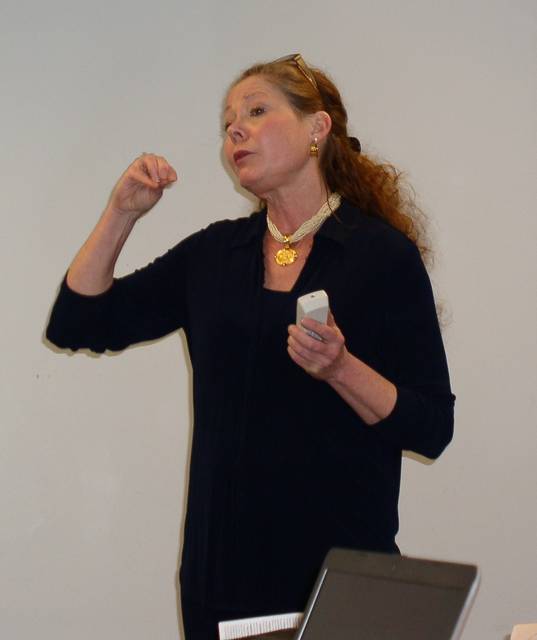State grant does battle against opioids
Published 10:06 am Tuesday, February 13, 2018

Jan Runions | Claiborne Progress
Catherine Brunson, regional overdose prevention specialist for Allies of Substance Abuse Prevention of Anderson County, trains local law enforcement in Naloxone use. The drug, if administered immediately after opioid overdose, counteracts the effects for the short term, allowing medical help the time to arrive on scene.
Tennessee is funneling money and information via the ‘Save a Life Project’ to combat the current wave of opioid abuse, topping out at an all-time high of 6,036 lives lost across the state, through overdose, in the last five years.
The state is currently the No. 2 worst offender of opioid misuse. East Tennessee has the highest number of opioid abuse of all regions within the state.
Every 21 minutes, someone dies from drug overdose, which is considered the No. 1 accidental cause of death across the country.
The United States currently consumes twice the amount of opioids, per capita, than any other country in the world.
A portion of the ‘Save a Life Project’ deals with getting into the hands of the public a safe drug that will counteract the effects of an opioid overdose long enough for medical help to arrive.
Catherine Brunson, regional overdose prevention specialist for Allies of Substance Abuse Prevention (ASAP) of Anderson County, spent a bit of time last week with local law enforcement as she trained them in the use of Naloxone, a safe drug that temporarily counteracts the effects of opioid overdose.
When too much of an opioid medication is taken, it can slow breathing to a dangerously low rate. When breathing slows too much, death can occur.
Naloxone can reverse this potentially fatal situation by allowing the person to breathe normally again, she said.
The drug works by blocking opiate receptors to the brain, making opiates ‘unrecognizable’ to the body.
“This is a temporary fix. Always call for emergency help once the Naloxone has been administered,” said Brunson.
She addressed some erroneous beliefs people have used when trying to help a loved one or friend who has overdosed.
Do not put a person in a bath. They could drown. Do not induce vomiting or give them something to drink. They could choke.
Putting a person in an ice bath or doing anything to further cool their body temperature can further depress the heart rate, she said.
“Do not slap or kick the person to bring them out of the stupor or inject them with a foreign substance like salt water or milk. This could lead to infections of the skin or heart and could lead to abscesses and the transmission of viruses,” said Brunson.
The ‘Good Samaritan’ law, adopted by the Tennessee legislature in 2014, provides civil immunity for anyone who administers Narcan, the trademark name of Naloxone, to someone they reasonably believe is overdosing on an opioid.
A portion of the grant provides training for health professionals on opioid use disorders, best practices for prescribing opioids, pain management, co-prescribing practices, screening for substance use disorder, referrals to treatment programs and overdose prevention.
“The goal is to provide healthcare professionals with the necessary training and skills to better serve their patients and ensure the highest quality of care,” said Brunson.
The ‘Save a Life Project’ is a multi-pronged program aimed at reducing the number of overdose-related deaths by improving access and availability to clinical treatment and recovery services. The state is working to expand access to medication assisted treatment, implementing new strategies for pregnant women and training professionals and key stakeholders on opioid use disorders. An Overdose Rapid Response System has been created, to address overdose outbreaks.
Allies of Substance Abuse Prevention is partnering with ETSU Quillen School of Medicine to provide training to area professionals. These trainings satisfy mandatory CME requirements for physicians licensed by the Tennessee Board of Medical Examiners.
The conference will include training in screening and assessing patients for substance abuse disorders, understanding the neuro-biological basis for pain and how to retrain the pain perceptions of a patient.
Attendees will also gain knowledge of alternative therapies and the use of medication for treatment and for post-operative pain.
The first seminar will occur from 6 p.m. to 8:30 p.m. on March 6 in the Cheyenne Conference Room at Methodist Medical Center of Oak Ridge. The second training will be held during the same time on March 8, at the LeConte Medical Center in Sevierville.
Dr. Don Teater, a physician at Meridian Behavioral Health Services and owner of Teater Health Solutions, will be presenting the conferences. Meridian specializes in working with medical and governmental agencies to reduce opioid prescribing, to improve pain treatment and to prevent addiction.
The link to the training is: www.etsu.edu/com/cme/opioid_addiction_2018.php.
For more information, contact ASAP at: info@asapofanderson.org or call 865-457-3007. If you or anyone you know is suffering with a substance use disorder, contact the Tennessee REDLINE at 800-889-9789 or log onto: www.taadas.org/Redline.htm.






